43 which of the following vitamins and minerals is not mandatory on a food label?
Solved 1. Which of the following vitamins/minerals does NOT | Chegg.com Which of the following vitamins/minerals does NOT have to be listed on this food label? a. Calcium d. Vitamin C b. Niacin e. None of them have to be c. Vitamin A 2. What % of calories comes from fat in 3 servings of this food? a. 16% d. 150% b. 53% e. 162% c. 75% 3. This food is "high" in which nutrient? a. Fiber d. Iron b. Calcium e. Nutrition facts label - Wikipedia The nutrition facts label (also known as the nutrition information panel, and other slight variations) is a label required on most packaged food in many countries, showing what nutrients and other ingredients (to limit and get enough of) are in the food. Labels are usually based on official nutritional rating systems.Most countries also release overall nutrition guides for general educational ...
New Food Label Spotlight: Vitamins and Minerals 600 IU of vitamin D daily. 1000 mg of calcium daily. 8-18 mg of iron daily. 4700 mg of potassium daily. The new Nutrition Facts label will list how much of each of those nutrients are available in a given food, along with what percentage of the total daily nutrient need that that product will fulfill.

Which of the following vitamins and minerals is not mandatory on a food label?
Changes to the Nutrition Facts Label | FDA - U.S. Food and Drug ... Manufacturers of most single-ingredient sugars, such as honey and maple syrup, and certain cranberry products have until July 1, 2021 to make the changes. The compliance dates are still in place,... FDA Rounding Rules for Your Food Label - LabelCalc A statement that says something to the effect of "not a significant source of X nutrient" if all four required vitamins and minerals are less than 2%. 2% if the value is greater than 1% (excluding Vitamin A and C). 10% or less of the RDI for any vitamins or minerals, round to the nearest 2% increment (i.e. 5 rounds to 6). Federal Register :: Food Labeling: Revision of the Nutrition and ... Web27.05.2016 · We also were interested in some other possible label format changes and therefore chose to study the effects of moving the location of sodium declaration on the Proposed single column label (in the format study), as well as the declaration of voluntary vitamins and fats (voluntary vitamins, voluntary fats, and both vitamins and fats) (in …
Which of the following vitamins and minerals is not mandatory on a food label?. Dietary Supplement Labeling Guide: Chapter IV - FDA This results in the following order for vitamins and minerals: Vitamin A, vitamin C, vitamin D, vitamin E, vitamin K, thiamin, riboflavin, niacin, vitamin B6, folate, vitamin B12, biotin,... CFR - Code of Federal Regulations Title 21 - Food and Drug Administration For the most up-to-date version of CFR Title 21, go to the Electronic Code of Federal Regulations (eCFR). Subpart C - Specific Nutrition Labeling Requirements and Guidelines. Sec. 101.36 Nutrition labeling of dietary supplements. (a) The label of a dietary supplement that is offered for sale shall bear nutrition labeling in accordance with this ... Nutrition Labels 101: What's Required? What's Optional? Vitamins A and C will no longer be required on the FDA's Nutrition Facts labels (though manufacturers may still include them if they choose), while Vitamin D and Potassium will now be required. The percent of the daily value is expressed in 2% increments from 2-10% of the daily value; in 5% increments from 10 to 50% of the daily value; and in ... TBT - European Commission Web17.11.2022 · Draft Commission Implementing Decision not approving dAllethrin as an existing active substance for use in biocidal products of producttype 18 in accordance with Regulation EU No 5282012 of the European Parliament and of the Council . European Union - 2022/10/10 Draft Commission Delegated Regulation amending the Annex to Regulation …
Vitamins and Minerals | NCCIH Vitamins and minerals are essential substances that our bodies need to develop and function normally. The known vitamins include A, C, D, E, and K, and the B vitamins: thiamin (B 1 ), riboflavin (B 2 ), niacin (B 3 ), pantothenic acid (B 5 ), pyridoxal (B 6 ), cobalamin (B 12 ), biotin, and folate/folic acid. EUR-Lex - 32011R1169 - EN - EUR-Lex - Europa WebIn the following cases, food business operators, within the businesses under their control, shall ensure that the mandatory particulars required under Articles 9 and 10 shall appear on the prepackaging or on a label attached thereto, or on the commercial documents referring to the foods where it can be guaranteed that such documents either accompany the food … Which of the following is not required by law to be listed on a food label? The U.S. Food and Drug Administration (FDA) currently requires sodium to be listed on nutrition facts, but potassium labeling is optional. "The declaration of potassium is only mandatory when a nutrient/content or health claim about potassium is being made," a representative from the FDA told Reuters Health via email. Which of the following vitamins or minerals is not required to be on a ... What vitamins and minerals must be included on the label? The only micronutrients that must be listed on a food label are vitamin D, calcium, iron, and potassium. Other vitamins and minerals in the food can be listed voluntarily by food makers. Many nutrients have a daily value expressed as a percentage (percent DV).
Vitamins and minerals - British Nutrition Foundation WebLabelling of vitamins and minerals. The back-of-pack nutrition information provided on food labels sometimes indicates the amount of vitamins and minerals that a product contains as a percentage of the reference intake (RI), as outlined in European law, although it is not mandatory to provide this information. Other than in Northern Ireland ... Nutrition labelling | Food Standards Agency WebMandatory information. When providing nutrition information, you are required to declare: energy value; amounts of fat, saturates, carbohydrate, sugars, protein and salt; The content of the mandatory nutrition declaration can be supplemented with an indication of the amounts of one or more of the following: monounsaturates; polyunsaturates ... Vitamins and Minerals | Nutrition.gov Vitamin and Mineral Supplement Fact Sheets. HHS, National Institutes of Health, Office of Dietary Supplements. Explore an A to Z list of fact sheets for vitamin and mineral supplements. which of the following is not required on a food label? (points : 2 ... The information which is not required on a food label is: Vitamin D percentage. What is a food label? A food label can be defined as a paper document which contains information about the nutrients and other ingredients that are present in a food or an edible material. The information on a food label.
Which of the following vitamins must be included on the food label? What are vitamins name the types of vitamins Class 12? Vitamins are compounds of carbon which are essential for the normal growth and working of the body. They are required in very small quantities. The important vitamins are A, C, D, E, K and B-complex (B1, B2, B3, Bs, B6, B7, B9 and B12). How do we get vitamin B?
Fortified foods: guidance to compliance on European Regulation … Web08.01.2021 · Vitamins and minerals not listed in Annex I or forms not listed in Annex II can continue to be used until 19 January 2014, as long as they were used in food that was marketed on 19 January 2007 ...
Which vitamins and minerals are required on the new nutrition facts label? Biotin, choline, folate, niacin, pantothenic acid, riboflavin, thiamin, and vitamins A, b6, b12, c, d, e, and K are among the 14 vitamins that may be stated on the Nutrition Facts label. Minerals are inorganic substances present in soil and water naturally. Which vitamins are required to be listed on the nutrition information panel?
eatright.org - Academy of Nutrition and Dietetics WebFood is essential for everyone. It plays a role in our culture, heritage and everyday lives, from ordinary days to special occasions and holidays. Learn about the importance of each food group and how to properly plan and prepare nutritious meals and snacks in a safe way.
What Vitamins And Minerals Are Required On A Food Label Vitamins Required on Label Vitamin D and potassium values are required. Vitamins A and C will not be required however could be included on a voluntary foundation. Slight Lower in Sodium Allowance The day by day restrict for sodium decreased barely from 2,400 mg per day to 2,300 mg per day.
CODEX GUIDELINES ON NUTRITION LABELLING - Food and Agriculture Organization 3.2.4 In addition to the mandatory declaration under 3.2.1, 3.2.2 and 3.2.3, vitamins and minerals may be listed in accordance with the following criteria: 3.2.4.1 Only vitamins and minerals for which recommended intakes have been established and/or which are of nutritional importance in the country concerned should also be declared. 3.2.5 When ...
Changes to the Nutrition Facts Label | FDA - U.S. Food and Drug ... Web07.03.2022 · The updated label appears on the majority of food packages. Manufacturers with $10 million or more in annual sales were required to update their labels by January 1, 2020; manufacturers with less ...
Chapter 8 - Nutrition Flashcards | Quizlet Which of the following foods does not require a nutrition label in the United States? ... Based on the changes to food labels announced in 2016, which vitamins and minerals are required on the new label format? (Choose every correct answer.) vitamin D iron potassium
EUR-Lex - 32006R1925 - EN - EUR-Lex - Europa WebGiven that detailed rules on food supplements containing vitamins and minerals have been adopted by Directive 2002/46/EC of the European Parliament and of the Council of 10 June 2002 on the approximation of the laws of the Member States relating to food supplements (3), provisions of this Regulation regarding vitamins and minerals should …
Food labeling: MedlinePlus Medical Encyclopedia VITAMINS AND MINERALS Vitamin D, calcium, iron, and potassium are the only micronutrients required to be on the food label. Food companies can voluntarily list other vitamins and minerals in the food. PERCENT DAILY VALUE (% Daily Value) Many nutrients include a percent daily value (%DV).
Which of the following vitamins and minerals is not mandatory on a food ... Vitamin D, Potassium, and Minerals Vitamins A and C will no longer be required on the FDA's Nutrition Facts labels (though manufacturers may still include them if they choose), while Vitamin D and Potassium will now be required. Click to explore further. Similarly, you may ask, is vitamin D required on a food label?
CFR - Code of Federal Regulations Title 21 - Food and Drug Administration Alternatively, except as provided for in paragraph (f) of this section, if vitamin D, calcium, iron, or potassium is present in amounts less than 2 percent of the RDI, label declaration of the nutrient(s) is not required if the statement "Not a significant source of - (listing the vitamins or minerals omitted)" is placed at the bottom of the ...
New Nutrition Facts Label in 2020: Changes and What to Know - Healthline However, vitamins A and C are no longer required to be listed on the new nutrition facts label. Both of these vitamins are found in a variety of food sources, and deficiencies in these ...
Nutrition Facts Labeling — FDA Reader When additional vitamins and minerals are listed, the following order should be preserved: Vitamins (listed in order) Vitamin A Vitamin C Vitamin D Vitamin E Vitamin K Thiamin Riboflavin Niacin Vitamin B6 Folate Vitamin B12 Biotin Pantothenic Acid Choline Macronutrients & Minerals (In order) Calcium Iron Phosphorus Iodine Magnesium Zinc Selenium
Chapter 2 Flashcards | Quizlet because added sugars contribute to negative health conditions and should be consumed in very limited quantities Which of the following vitamins and minerals is NOT mandatory on a food label? -Calcium -Vitamin A -Vitamin C -Potassium potassium The first law requiring food labels to contain nutrition information was passed in 2000. false
The Nutrition Facts Label: Its History, Purpose and Updates The U.S. Nutrition Facts label first appeared in 1994 and was revised in 2016. A newer, more updated version is required on products as of January 1, 2020. There is a new line on the Nutrition Facts label for added sugars—the first new line on the label since trans fat was added in 2006. Serving sizes were established in 1993 and updated in 2016.
Dietary Supplement Labeling Guide: Chapter IV - FDA WebYou should use the units of measurement given in 21 CFR 101.9(c)(8)(iv) for the Daily Values of vitamins and minerals when listing these nutrients in "Supplement Facts" (e.g., the amount of ...
Federal Register :: Food Labeling: Revision of the Nutrition and ... Web27.05.2016 · We also were interested in some other possible label format changes and therefore chose to study the effects of moving the location of sodium declaration on the Proposed single column label (in the format study), as well as the declaration of voluntary vitamins and fats (voluntary vitamins, voluntary fats, and both vitamins and fats) (in …
FDA Rounding Rules for Your Food Label - LabelCalc A statement that says something to the effect of "not a significant source of X nutrient" if all four required vitamins and minerals are less than 2%. 2% if the value is greater than 1% (excluding Vitamin A and C). 10% or less of the RDI for any vitamins or minerals, round to the nearest 2% increment (i.e. 5 rounds to 6).
Changes to the Nutrition Facts Label | FDA - U.S. Food and Drug ... Manufacturers of most single-ingredient sugars, such as honey and maple syrup, and certain cranberry products have until July 1, 2021 to make the changes. The compliance dates are still in place,...
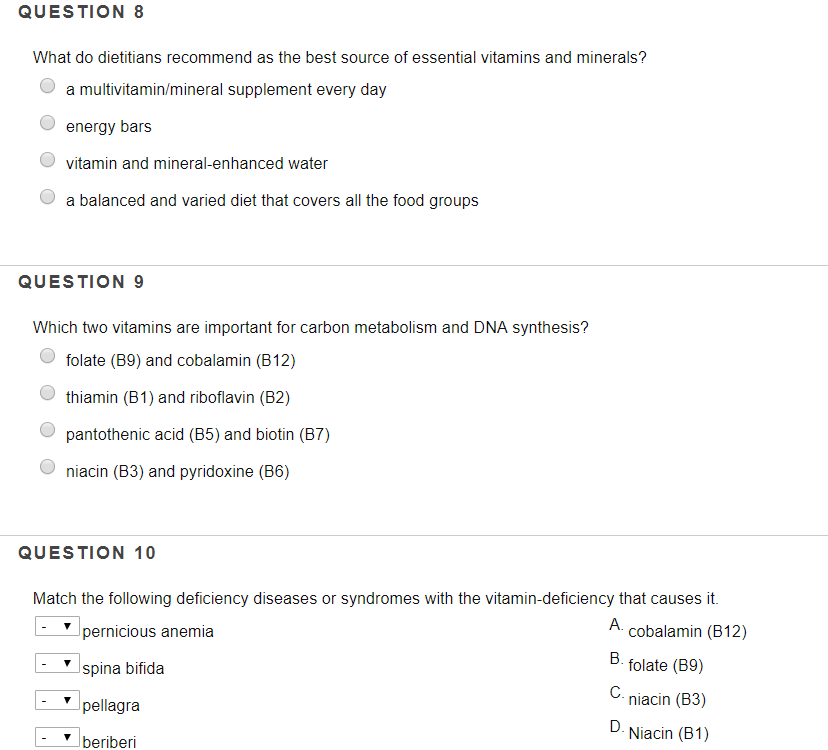








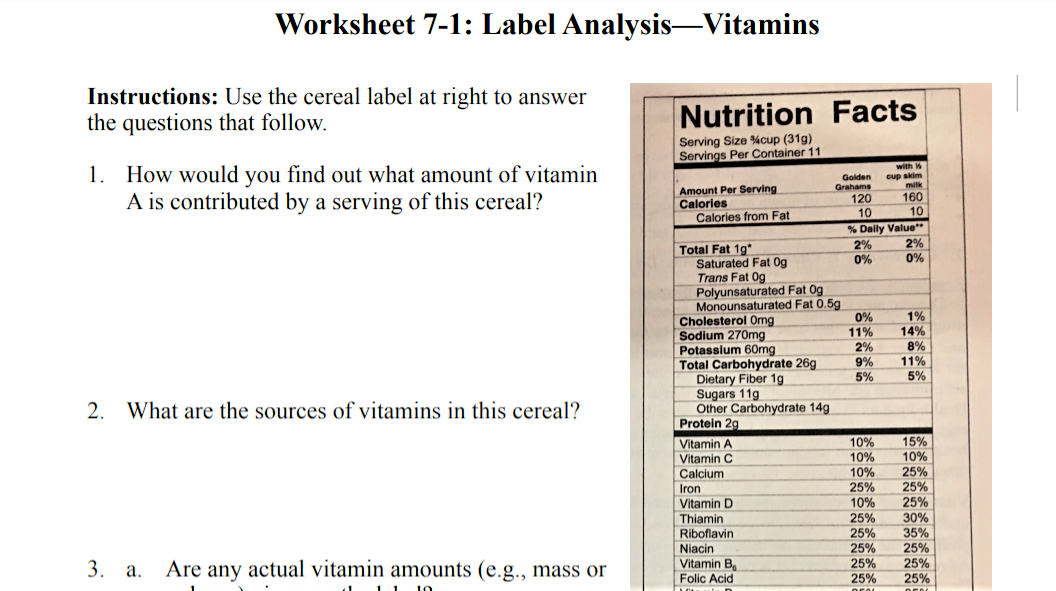
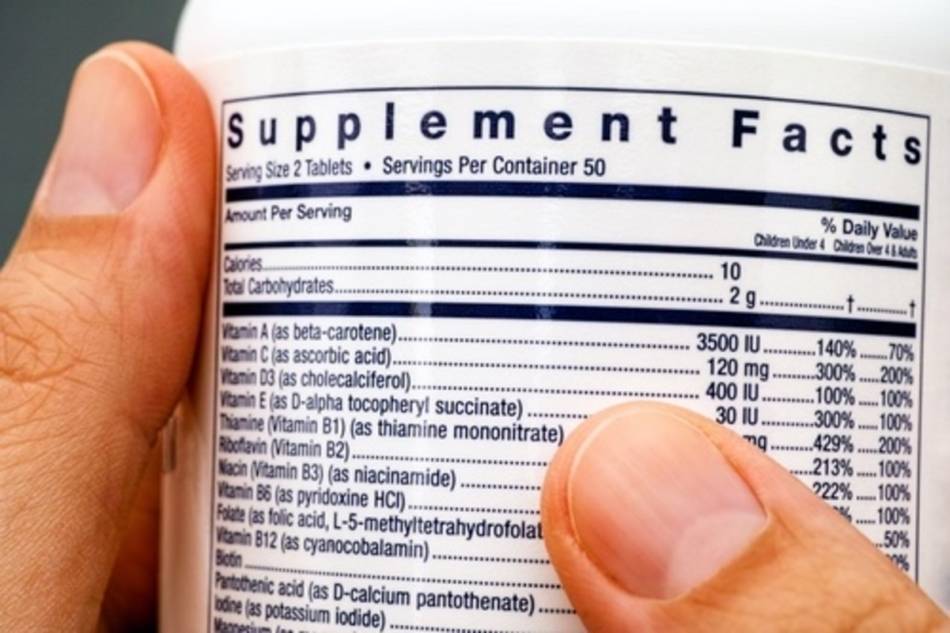
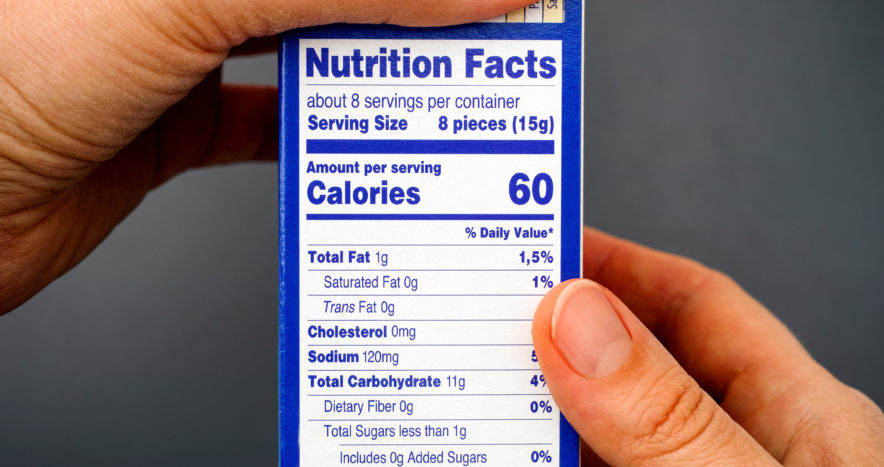

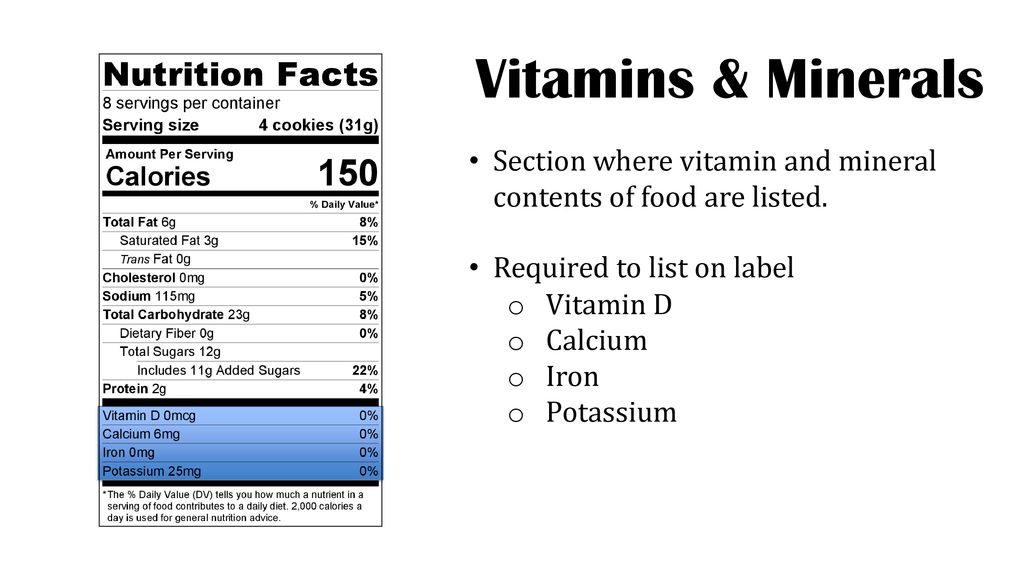
:max_bytes(150000):strip_icc()/nutrients-what-they-are-and-why-you-need-them-2507078-FINAL-e65d7ad29bdf4d99afca860abc76d19a.png)

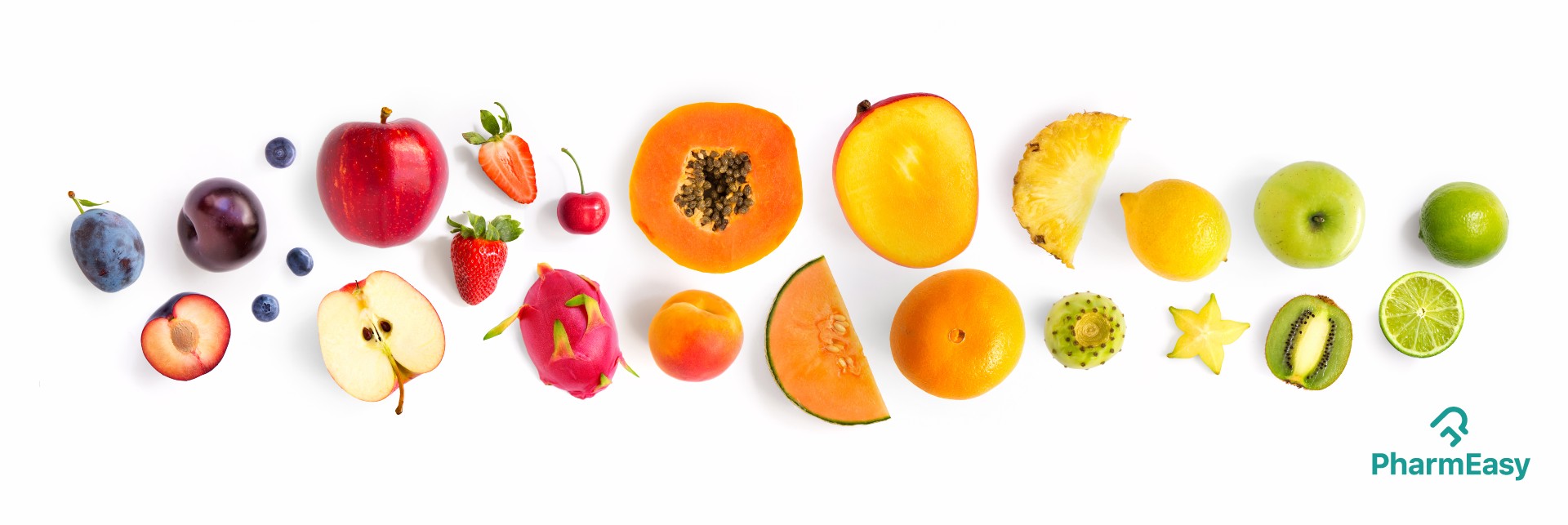
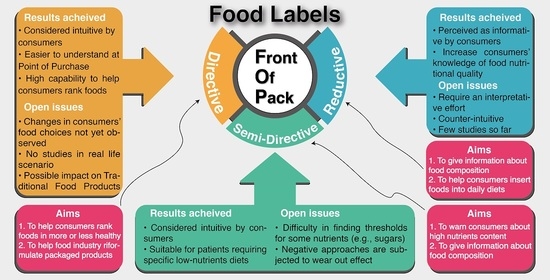


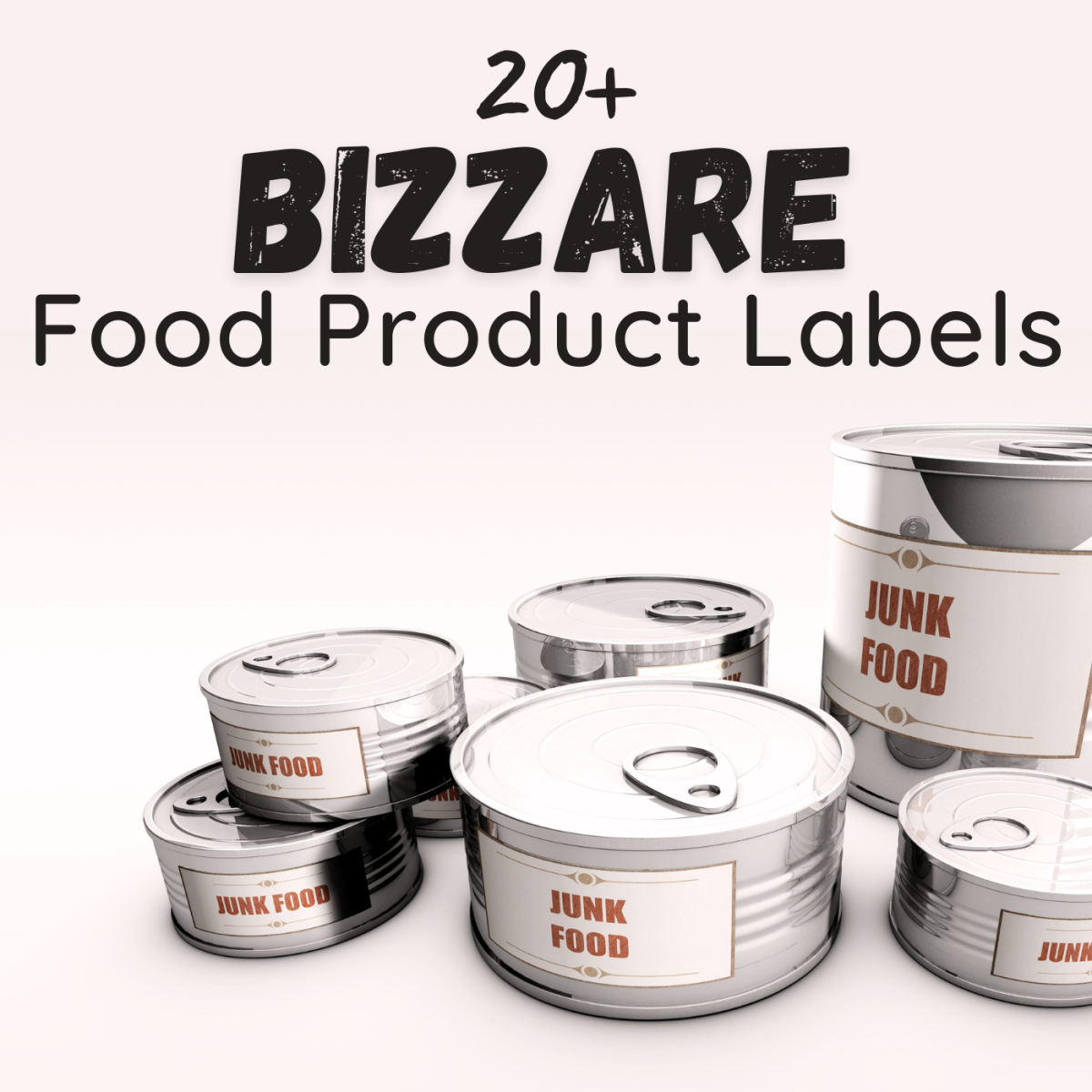

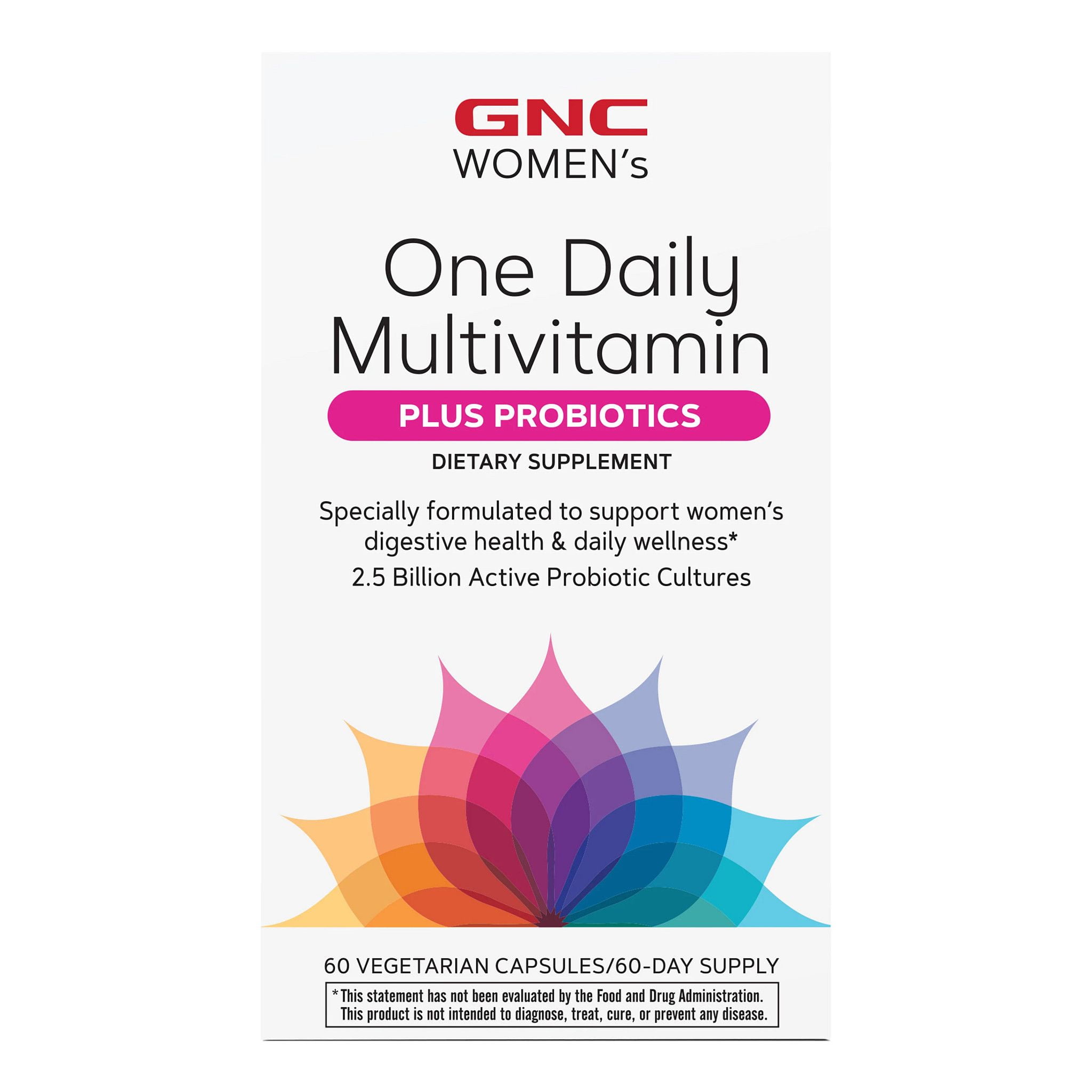
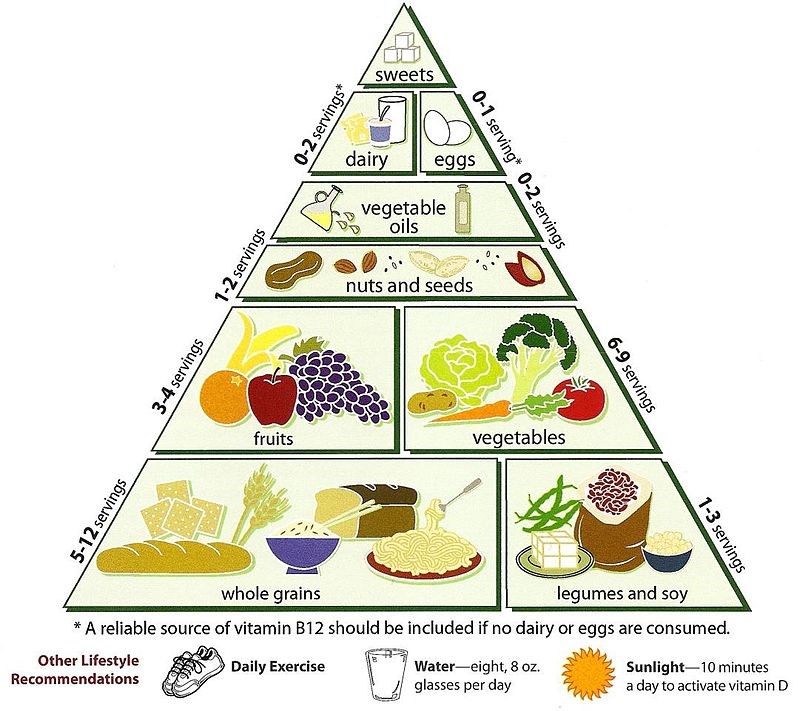



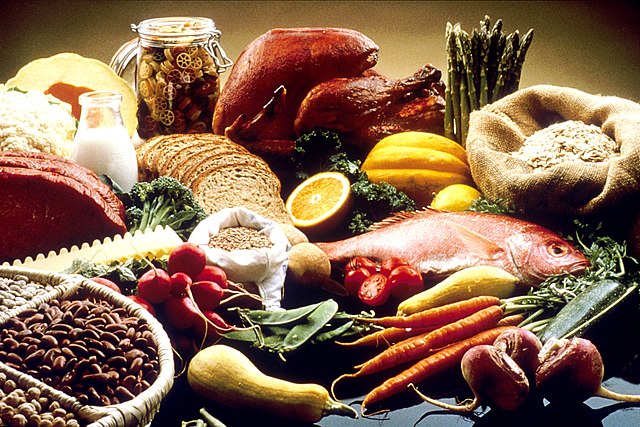



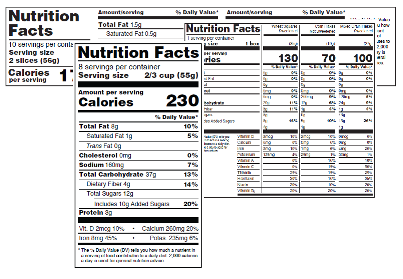
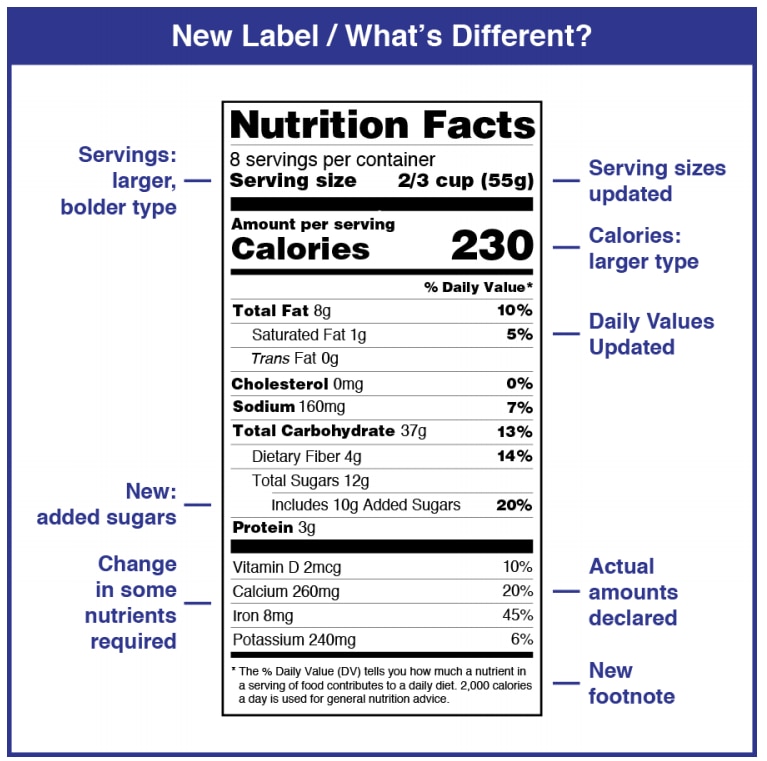

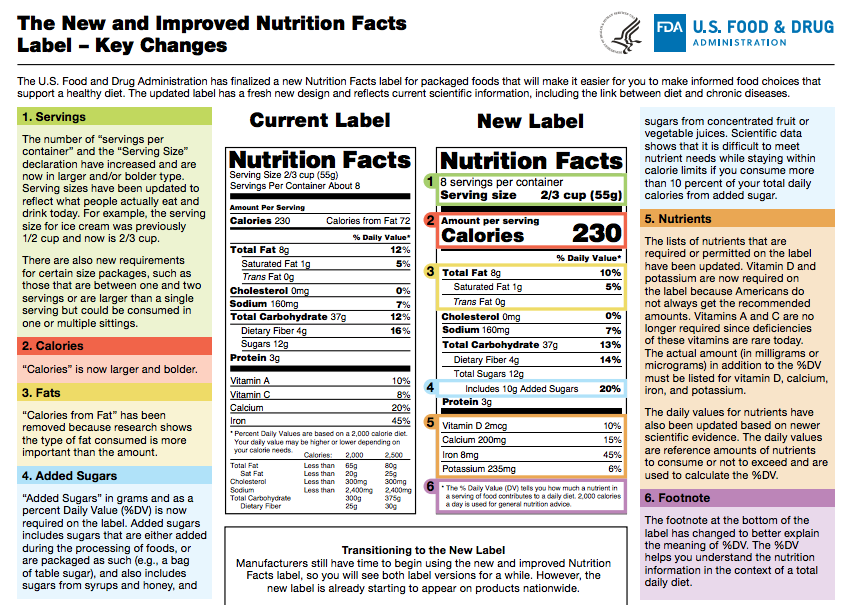
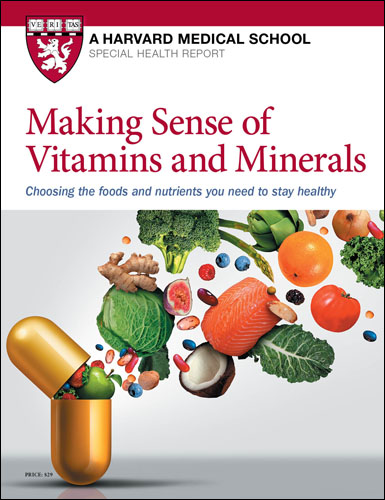


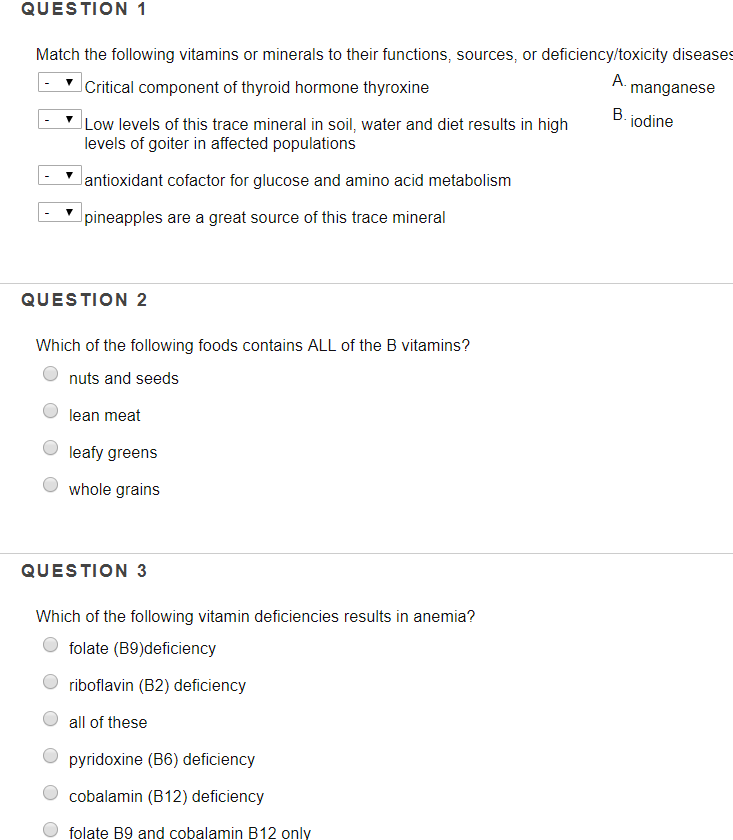

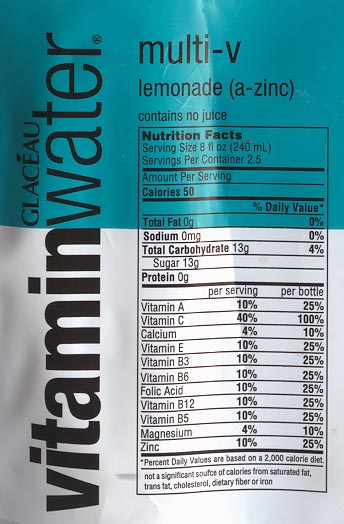
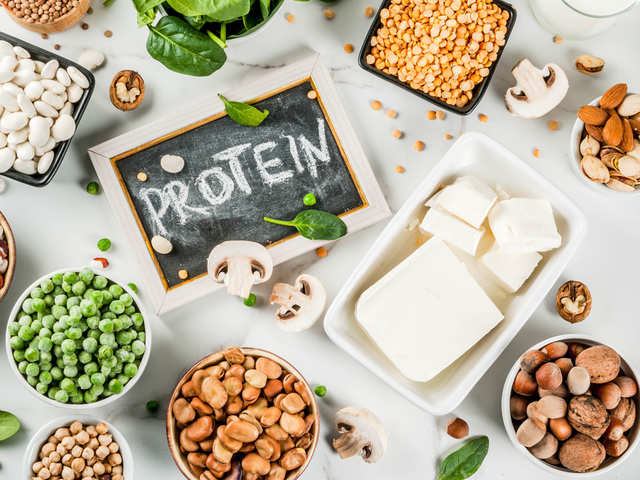
Post a Comment for "43 which of the following vitamins and minerals is not mandatory on a food label?"